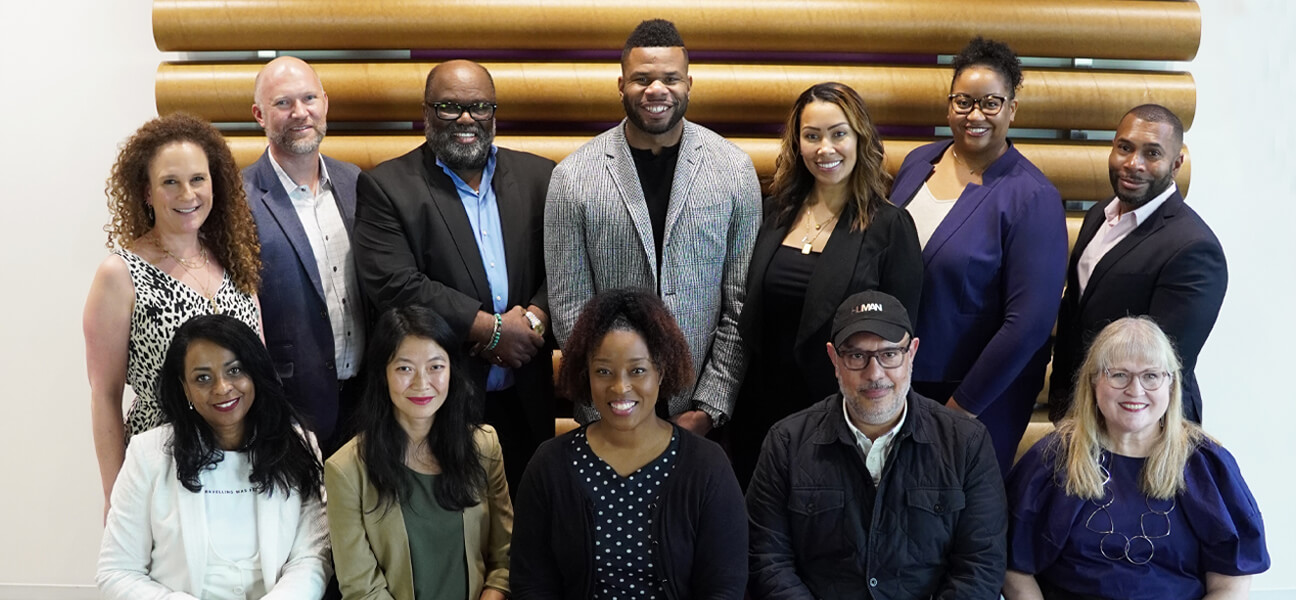It is undeniable that there is a lack of diversity in the executive ranks of the hospitality industry. In fact, the 2022 edition of the “Black Representation in Hospitality Industry Leadership” report from Castell, an AHLA Foundation Project found that Black executives represented 2% of hospitality industry executives at the director through CEO level on 671 company websites at the end of 2021.
During the recent Hotel Business executive roundtable, “DEI: Checking Boxes Isn’t the Answer,” hosted and sponsored by Valley Forge Fabrics (VFF) at its Fort Lauderdale, FL, headquarters, industry executives offered their opinions as to why the industry struggles to attract minority applicants, and shared their thoughts on best practices on how to recruit and retain a diverse workforce.
Moderated by Christina Trauthwein, VP, content & partnerships, Hotel Business, the panel included Aaron Anderson, founder, The 26 Co; Pamela Bristow, procurement category manager, IHG Hotels & Resorts; Diana Dobin, co-CEO/chief sustainability officer, Valley Forge Fabrics; Gina Goodin, associate principal, CRTKL; Nina Grondin, partner/cofounder, Curioso; Andy Ingraham, founder/president/CEO, National Association of Black Hotel Owners, Operators and Developers (NABHOOD); Dionne Jefferson, VP, design & project management, premium brands, Marriott International; Ashli Johnson, executive director, Howard University School of Business, Marriott Sorenson Center for Hospitality; Catherine Josey, principal, Studio South Design; Jason Rosewell, VP, facilities, Mandalay Bay | Delano Las Vegas | Luxor | Four Seasons Las Vegas; Steve Schrope, director, project management, CBRE; and Bashar Wali, founder/CEO, This Assembly and founder/CEO, Practice Hospitality.
Before the discussion began, Gregory Haile, president, Broward College, spoke to the panel and an intimate gallery of people invited by VFF about his journey and how his school has one of the most diverse student bodies among higher education institutions nationally. He also presented a call to action to the hospitality executives in the room to self-audit and evaluate how they’re providing opportunities to underserved communities. An exclusive video featuring encouraging words from President Haile, will be available on hotelbusiness.com soon.
Panelists were then led on an in-depth tour around the VFF facility before gathering back at the boardroom for the roundtable discussion.
During a round of introductions, Ingraham shared that his mother didn’t want him to work in hospitality because “she had never met any executive that looks like us in the hotel industry.” This was the perfect segue into the first question posed to everyone by Trauthwein: Why doesn’t a more diverse pool of candidates look to the hospitality industry as a career path and a path of growth, and why should they?
Josey agreed with Ingraham’s mother’s thoughts. “It is not an industry [we] really know about because no one looks like you,” she said. “You don’t see that often.”
Roswell didn’t even know there was a career path for him in the industry. “A lot of us grow up knowing about the traditional jobs—nurses, doctors, things like that,” he said. “You don’t really have access to more nontraditional jobs, and you don’t know anything about them. We all know that there’s someone that makes a bed, parks a car and checks you in. But you don’t know all the stuff that goes on behind that to make that happen.”
Wali believes that a lot of people of color view working in hospitality as servitude “because they only see themselves as servants to the customer. They don’t see anyone that looks like them at the top.”
He added, “Unless we see more people that look like all of us around the table at the top, it’s always viewed as, ‘Sure, you can clean toilets [at a hotel], but you can never own or build [a hotel].”
For Ingraham, in order to get past this mindset of servitude, Black executives must tell the story of how great the industry is. He added, “We also have to find partners who are committed to changing the paradigm. When I sit in boardrooms, I find that the only time people want to change is when I’m buying something from them.”
While there is a distinct difference between service and servitude, Johnson pointed out there’s also a difference between the delivery of service and the business of service.
“A majority of us sitting here at this table are engaged in the business of service, and that is what has historically eluded a lot of Black and brown folks who are interested in hospitality because the opportunities that are traditionally afforded to them are entrenched in the delivery of service, not in the business of it,” she said. “From a historical lens and perspective, why families may not be as supportive of Black and brown people pursuing careers in hospitality is because the frame of reference is that your grandfather was a bellman at a hotel that he couldn’t even lay his head in for 30 years—and that’s what perhaps [pays] your college education. That’s what made all of these opportunities available to you.”
She continued, “While most people would agree that hospitality is such a great industry, historically, it has not been great for everyone. So, when we hear people say, ‘Hey, this is the best business in the world and the only business that you can start as a dishwasher and end up as CEO,’ I am quick to correct people to say, ‘But that’s not applicable for Black folks.’ We really have to keep it real in identifying what has been created as an opportunity of exposure traditionally for people of color and women in this business.”
Dobin explained that the tools we have today can make it easier to get the word out that there are opportunities out there for minorities and people who can help them on their path in the industry.
“I do think that we’re living in very different times today, and I really see the connections between people and the networking that people do—everybody pretty much has a phone, people are all using social media—and this can be used to drive this change today in a way that it couldn’t in the past.”
As an example, she told how Trauthwein pointed her to Ingraham as someone who could find a Black-owned restaurant to hold the roundtable dinner the night before (it was held at Canyon restaurant in Fort Lauderdale, owned by Thompson Hospitality). “I had to find somebody because no matter how I looked online, I could not find the information,” she said.
But when is the right time to use these tools to communicate to young people the benefits of a career path in the hotel industry? Goodin believes it would be smart to reach out to them early on.
“How many kids don’t have exposure to architects and interior designers and don’t know that it’s more than what they see on HGTV decorating a house?” she asked. “I came from a rural area where nobody knew what a designer was, and I’ve designed hotels for some of the best companies in the world and traveled all over the world.”
The industry always has to nurture young talent because there is always a wave of turnovers, whether from a rash of retirements, an economic downturn or a pandemic.
“It happens every 10-12 years where you lose a wave of talent,” said Grondin. “Folks retire out, especially on the design side and architecture side. People leave and a whole new batch comes in. We’re going to hit a serious gap about the talent that we bring in because they haven’t necessarily walked alongside mentors so that they can step into the roles. We want them experienced and ready to go.”
Schrope believes that the industry should be celebrating the idea of a cyclical nature that offers opportunities every seven-10 years, adding, “If you look at the investment side of hotels, there are people who couldn’t wait to come out of the pandemic and buy distressed assets. And we need to be talking about that across the industry, as these are the opportunities. If you’ve been stuck [in one place] for a while, there’s a position over there that just opened up because that whole department got screwed up—and you should be jumping.”
Bristow, who has only worked in the industry for a year and a half, has noticed that people of color find it difficult to navigate up the corporate ladder.
“If you see there’s not a lot of diversity within a particular department or group, it’s almost like there’s only room for one [minority executive],” she said. “So, if there’s only room for one Black VP, and you’re ready to make that move—or you’ve been told that you’re ready to make that move—it’s like, ‘Great, I have to wait until that person is [gone].”
To be sure, it will take some time and a lot of work to bring as much diversity as there is on the property level into the C-suite. But, as the roundtable panelists underscored, the story must get out there that the hotel industry is a rewarding career path to take.
Look for video interviews with the panelists soon on hotelbusiness.com. Extended coverage of the roundtable will be featured in the February issue of Hotel Business.


